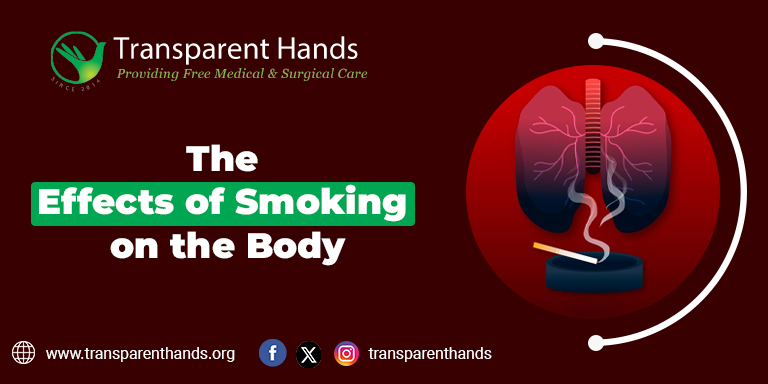The Effects of Smoking on the Body

According to the American Lung Association, there are approximately 600 ingredients in cigarettes, creating more than 7000 chemicals when burned. At least, 69 of these are known to cause cancer. One of its toxic chemicals, nicotine, works on the brain to create a feeling of relaxation which makes it difficult to quit smoking.
Smoking can cause long-term negative effects on the body, including heart disease, diabetes, and lung cancer. The reason behind its detrimental health effects is the use of tobacco. Tobacco contains acetone, tar, nicotine, and carbon monoxide which affect the lungs and other organs of the body when inhaled.
While most people are aware of the consequences of smoking, more than 8 million people die each year because of it! This article discusses the adverse effects of smoking on the body.
How Smoking Affects Our Overall Health, Body, and Lifespan
Smoking is the prime cause of numerous diseases. It also greatly contributes to shortening the lifespan. According to the Centers For Disease Control And Prevention (CDC), smoking causes over 480,000 deaths each year in the United States alone. This is nearly one in five deaths. The most common health issues associated with smoking are:
Cancer
Smoking is the prime reason behind the increased risk of lung cancer, as well as mouth and throat cancer.
Chronic Obstructive Pulmonary Disease (COPD)
Chronic Obstructive Pulmonary Disease (COPD) is a lung disease that is usually caused by smoking. Its common symptoms include a cough that doesn’t go away, called chronic bronchitis and lung damage, emphysema.
Respiratory Infections
Smoking weakens the body’s immune system. This means the body produces fewer antibodies, which are crucial for fighting off diseases and infections. Smokers often experience viral and bacterial infections like pneumonia and tuberculosis.
Effects of Smoking on the Heart
Smoking contributes greatly to heart and blood vessel diseases. Research shows people who smoke have a 2 to 4 times higher risk of developing heart disease than nonsmokers.
This is because it encourages the formation of fatty plaque in blood vessels. Smoking damages the inner walls of the arteries. This causes the thickening and narrowing of blood vessels linked to the heart. Moreover, carbon monoxide in tobacco smoke reduces the blood’s ability to transport oxygen. It elevates the level of triglycerides and lowers “good” cholesterol.
According to the American Heart Association, women who smoke have a 25% higher risk of developing heart disease compared to men who smoke. Smoking throughout your life can reduce your lifespan by 11 to 12 years.
Effects of Smoking on Mental Health and the Brain
Numerous studies have shown the negative effects of smoking on mental health. Regular consumption of tobacco smoke can lead to changes in the brain, resulting in depression and anxiety.
It is observed that, in many cases, people smoke to reduce stress. However, research shows smoking actually increases tension.
According to a study by Washington University School of Medicine in St. Louis, smoking shrinks the brain and causes premature brain aging. It can lead to a reduced volume of gray matter in the brain. Another study showed that people who smoke are 30% more likely to develop dementia than people who do not.
Effects of Smoking on Oral and Dental Health
People who smoke are at a higher risk of developing oral and dental health problems. It is important to check on your oral hygiene, teeth, and gums to prevent oral and dental diseases. Some of the most common effects of smoking on oral health are:
Bad Breath
Cigarette particles linger in the mouth even after you are done smoking. There is a build-up of bacteria and plaque, resulting in bad breath.
Oral Cancer
The longer you smoke, the more you increase the risk of oral cancer, particularly including the lips, tongue, cheeks, and other parts in the mouth. Its first sign is a sore or lump in the mouth that does not heal.
Gum Disease
Smoking causes a lack of oxygen in the bloodstream. Due to this, the infected gums exposed to bacterial plaques do not heal properly.
Teeth Discoloration
One of the effects of smoking on dental health is staining on the teeth because of nicotine and tar. These can make the teeth yellow in a short period.
According to NIH, a study in the US concluded that smoking is a significant risk factor for periodontitis and may account for 50% of periodontitis in adults.
Secondhand Smoking Also Causes Deaths
Secondhand smoke is the smoke inhaled by people who are not smoking themselves. It comes from the smoke a person breathes out while burning a tobacco product. It has more than 4000 chemical compounds, including at least 250 constituents that are dangerous for the central nervous system, immune system, heart, and liver.
The American Lung Association has highlighted that secondhand smoke causes approximately 7,330 deaths from lung cancer and 33,950 deaths from heart disease each year.
Conclusion
Smoking is a harmful habit that can harm the health of both the smoker and those exposed to passive smoking. As discussed in the article, the effects of smoking on health include heart diseases, cancer, stroke, and oral and dental diseases. Transparant Hands helps smokers who are trapped in the cycle of addiction by organizing free medical camps and preventive healthcare sessions. We also provide surgical and medical treatments for various types of cancers. Your donations can help those who are unable to access the medical help they desperately need.











Leave Your Comments